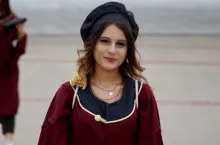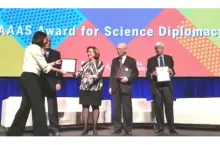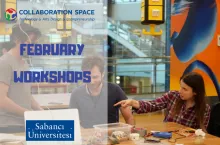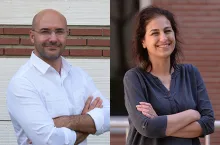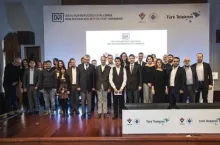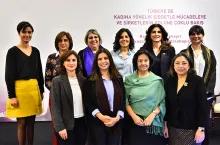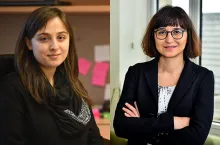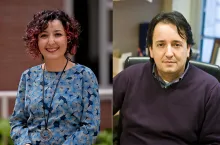A panel discussion was held on the role of companies in fighting domestic violence on Monday, February 4, at the Sabancı Center as part of the Sabancı University Corporate Governance Forum, TÜSİAD and UN Population Fund (UNFPA) project on "Business Against Domestic Violence" to help women take action against systematic pressure and violence they encounter at home or in their close relationships.

Back row: Sevda Alkan, Cansen Başaran-Symes, Meltem Ağduk, Nevgül Bilsel Safkan, Oya Ünlü Kızıl, Özge İzdeş TerkoğluFront row: Ebru Dicle, Sevgi Uçan Çubukçu, Fatmagül Berktay, Melsa Ararat"The society as a whole has to act in order to adopt a policy of zero tolerance to violence against women"

Oya Ünlü KızılThe panel discussion titled “Multiple Perspectives on Fighting Domestic Violence and the Role of Companies” began with introductory remarks by TÜSİAD Gender Equality Working Group Chair Oya Ünlü Kızıl. Oya Ünlü Kızıl said, “As we celebrate the fifth year of the 'Business Against Domestic Violence' project, I commend the 51 companies for owning up to this serious issue and taking steps towards a solution. I know that each and every participant of the project had valuable experiences that need to be disseminated. The society as a whole has to act in order to adopt a policy of zero tolerance to violence against women. Public authorities, the private sector and nongovernmental organizations need to unite in a stance for this purpose. It will take a holistic approach and extensive cooperation to tackle an issue so complex and multi-dimensional."
“We cannot speak of gender equality or justice unless we eliminate violence against women"

Melsa Ararat
Sabancı University Corporate Governance Forum Director and Chief Researcher Melsa Ararat gave a speech titled “The Business Against Domestic Violence Project as a Participatory Action Search and Social Action Example”. Melsa Ararat said, “We cannot speak of gender equality or justice unless we eliminate violence against women. But fighting violence against women is far from easy. It entails fighting male-dominant power relationships that have permeated every social norm, every institution and every understanding in the society. It requires a workplace safety and work performance perspective as well as a historical, social and political focus. We try to explain to companies that the inequality hits them as well as the economy, involve them in our research, and interpret outcomes together to facilitate their becoming active players in this fight. This is where I believe the roles played by TÜSİAD and member companies sets an example to the world. By taking active part, companies not only protect the safety and well-being of their own employees, but also contribute to Gender Equality as one of the United Nations Sustainable Development Goals. Academics in this panel have studied on the issue of business and domestic violence from a multidisciplinary lens."
“Women's visibility in social life, participation in politics, presence in business, and continuing education are still contested issues”
Following the speeches, UNFPA Gender Program Coordinator Meltem Ağduk moderated the panel discussion on "Multiple Perspectives on Fighting Domestic Violence and the Role of Companies". Speakers were Istanbul University Cerrahpaşa-Foreign Trade / Women's Studies Application and Research Center Assistant Professor Özge İzdeş Terkoğlu, Istanbul University-Political Science and International Relations / Women's Studies faculty member Professor Fatmagül Berktay, Istanbul University-Political Science and International Relations / Women's Studies faculty member Associate Professor Sevgi Uçan Çubukçu, and Sabancı University Corporate Governance Forum-BADV Project Manager Sevda Alkan.

Photo (left to right): Sevda Alkan, Fatmagül Berktay, Sevgi Uçan Çubukçu, Özge İzdeş Terkoğlu, Meltem Ağduk
eltem Ağduk stated, “Although people claimed that the 21st century would be the 'century of women', women's visibility in social life, participation in politics, presence in business, and continuing education are still contested issues; women and girls continue to suffer discrimination in every area. The 1990s were when fighting violence against women started to become institutional, while in the 2000s, the institutionalization went deeper and governments and the private sector became a part of it.”
Assistant professor Özge İzdeş Terkoğlu discussed the rate of women's participation in the economy in the EU, OECD and Turkey, and said that the quality of jobs offered to women was another challenge. Özge İzdeş Terkoğlu said that Turkey had one of the world's largest gender differences in employment, continuing, "The staggering gender difference in employment in Turkey, and its being exacerbated by cultural and economic bottlenecks has structural root causes."
Professor Fatmagül Berktay spoke, “Recognizing cultural and other differences is a prerequisite for a democratic society. Culture and tradition have inherent power relations which generally work against women in our society. The demand for gender equality is not a demand for 'sameness' that rejects differences. To the contrary, it is a call for respecting differences while ensuring equality in terms of fundamental human rights both in law and practice. The human rights of women are universal and enshrined in laws. Therefore, we must defend equality in both the public sphere and law at all times, and argue that concepts such as 'justice' that are being treated as its substitutes are misleading. Women do not want to be 'the same as men'; they want to be recognized as the equal humans that they are, and exercise each of their rights equally. This should not be a discussion matter in the 21st century."
Associate Professor Sevgi Uçan Çubukçu said, “Despite its issues, the feminist movement in Turkey made key contributions to the political and social culture in Turkey with its pluralistic potential, policies that tackle difference and equality issues together, methods, approaches and objectives, and continues to do so."
“We believe that a multi-dimensional issue requires a holistic approach, and that cooperative efforts which engage different stakeholders play a key part in its resolution”

Nevgül Bilsel Safkan
Closing remarks of the meeting were delivered by Sabancı Foundation General Manager Nevgül Birsel Safkan. “We cannot treat women's issues as distinct matters, nor can we develop solutions by segregating issues. Therefore, we believe that a multi-dimensional issue requires a holistic approach, and that cooperative efforts which engage different stakeholders play a key part in its resolution. The Business Against Domestic Violence Project implemented by the Sabancı University Corporate Governance Forum in association with TÜSİAD, the United Nations Population Fund (UNFPA) and Sabancı Foundation sets a brilliant example in this regard. The project ensures the cooperation of different actors, and empowers businesses to become stakeholders that play an active part in fighting domestic violence while recommending tangible solutions. By refusing to stay silent in a difficult subject like domestic violence, taking responsibility to fight the issue, and being bold in its moves, businesses are doing a great job. I believe that all participating companies not only ensure the equality of their own employees, but also make a significant contribution to social justice."

